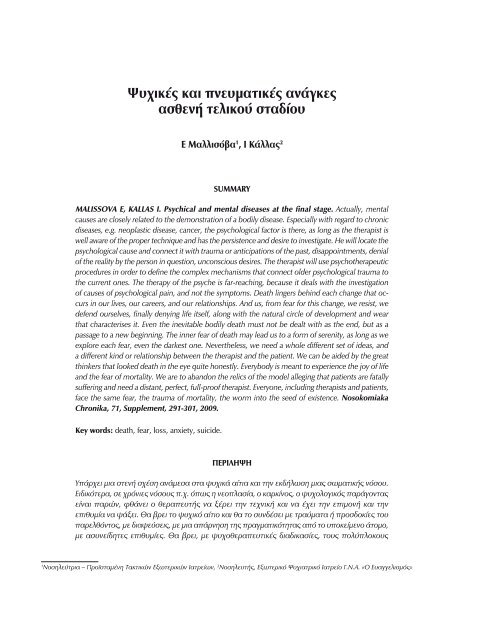290 Παροχή άνεσης στους ασθενείς με συμπτώματα εκτός πόνου: Ευρύτερη προσέγγιση in advanced cancer. Support Care Cancer 2000, 8(6): 444-452. 35. Grunberg SM, Srivastava A, Grunberg KJ, et al. Intensity of chemotherapy-induced emesis and overall survival as determinats of a global utility score. Support Care Cancer 2002, 10(8): 624-629. 36. Κατσαραγάκης Σ, Πατηράκη Ε. Ναυτία και έμετος που προκαλούνται από χημειοθεραπεία. Στο: Μπεσμπέας Σ, Πατηράκη Ε. (συγγρ). Μετεκπαιδευτικά μαθήματα Νοσηλευτικής Ψυχοκοινωνικής Ογκολογίας. 1η έκδ, Αθήνα, Ελληνική Αντικαρκινική Εταιρεία, 2006: 116- 136. 37. Rhodes VA, McDaniel RW. Nausea, vomiting and retching: complex problems in palliative care. CA Cancer J Clin 2001, 51: 232-248. 38. Bender CM, McDaniel RW, Murphy-Ende K, et al. Chemotherapy-induced nausea and vomiting. Clin J Oncol Nurs 2002, 6(2): 94-102. 39. Fallon M, O’ Neill B. ABC of palliative care: constipation and diarrhoea. BMJ 1997, 315(7118): 1293-1296. 40. Δανιηλίδης Ι, Οικονομόπουλος Π., Νταιλιάνας Α. και συν. Φάρμακα παθήσεων πεπτικού συστήματος. Στο: Εθνικό Συνταγολόγιο, Αθήνα, Εθνικός Οργανισμός Φαρμάκων, 2003, σελ: 37-80. 41. Choi YS, Billings JA: Opioid antagonists: A review on their role in palliative care, focusing on use in opioidrelated constipation. J Pain Symptom Manage 2002, 24(1): 71-90. 42. Lemone P, Bruke K. Νοσηλευτική φροντίδα ασθενών με διαταραχές του εντέρου. Στο: Lemone P, Bruke K. (eds). Παθολογική – Χειρουργική Νοσηλευτική: κριτική σκέψη κατά τη φροντίδα του ασθενούς. 3η εκδ. Αθήνα, Ιατρικές εκδόσεις Λαγός, 2006: 793-900. 43. Wasserman K, Casaburi R. Dyspnea and physiological and pathophysiological mechanisms. Annu Rev Med 1988, 39: 503-515. 44. Vigano A, Donaldson N, Higginson IJ, et al. Quality of life and survival prediction in terminal cancer patients: a multicenter study. Cancer 2004, 101(5): 1090-1098. 45. Epstein O, Perkin DG, DeBono DP, et al. Αναπνευστικό Σύστημα. Στο: Epstein O, Perkin DG, DeBono DP, et al (eds). Κλινική Εξέταση. 1η έκδ. Αθήνα, εκδόσεις Λίτσας, 2000: 99-130. 46. Twycross R. Symptom management in advanced cancer. 2nd ed. Oxford, Radcliffe Medical Press, 1997. 47. Qaseem A, Snow V, Shekelle P, et al. Evidenced-based interventions to improve the palliative care of pain, dyspnea and depression at the end of life: a clinical practice guideline from the American College of Physicians. Ann Intern Med 2008, 148(2): 141-146. 48. Budgeon DJ, Lertzman M. Dysnea in the advanced cancer patient. J Pain Symptom Manage 1998, 16(4): 212-219. 49. Bruera E, Sweeney C, Willey J, et al. A randomised controlled trial of supplemental oxygen versus air in cancer patients with dyspnea. Palliat Med 2003, 17(8): 659-663. 50. Congleton J, Muers MF. The incidence of airflow obstruction in bronchial carcinoma, its relation to breathlessness and response to bronchodilator therapy. Respir Med 1995, 89(4): 291-296. 51. Lemone P, Bruke K. Νοσηλευτική φροντίδα ασθενών με διαταραχές του κατώτερου αναπνευστικού συστήματος. Στο: Lemone P, Bruke K. (eds). Παθολογική – Χειρουργική Νοσηλευτική: κριτική σκέψη κατά τη φροντίδα του ασθενούς. 3η εκδ. Αθήνα, Ιατρικές εκδόσεις Λαγός, 2006: 1379-1515. 52. Servaes P, Verhagen C, Bleijenberg G. Fatigue in cancer patients during and after treatment: prevalence, correlates and interventions. Eur J Cancer 2002, 38(1): 27-43. 53. Portenoy RK. Cancer-related fatigue: an immense problem. Oncologist 2000, 5(5): 350-352. 54. Jenkins CA, Schulz M, Hanson J, et al. Demographic, symptom and medication profiles of cancer patients seen by a palliative care consult team in a tertiary referral hospital. J Pain Symptom Manage 2000, 19(3): 174-184. 55. Bruera E, Miller L, McCallion J, et al. Cognitive failure in patients with terminal cancer. A prospective study. J Pain Symptom Manage 1992, 7(4): 192-195. 56. Breitbart W, Bruera E, Chochinov H, et al. Neuropsychiatric syndromes and psychological symptoms in patients with advanced cancer. J Pain Symptom Manage 1995, 10(2): 131-141. 57. Inouye SK. Delirium in older persons. N Engl J Med 2006, 354(11): 1157-1165. 58. Davies A. The management of xerostomia: a review. Eur J Cancer Care 1997, 6(3): 209-214. 59. Block SD. Assessing and managing depression in the terminally ill patient. Ann Intern Med 2000, 132(3): 209-218. 60. Block SD. Psychological issues in end-of-life care. J Palliat Med 2006, 9(3): 751-772. 61. McMillan SC, Tittle M, Hagan S, et al. Knowledge and attitudes of nurses in veterans hospitals about pain management in patients with cancer. Oncol Nurs Forum 2000, 27(9): 1415-1423. 62. White KR, Coyne PJ, Patel UB. Are nurses adequately prepared for end-of- life care J Nurs Scholarsh 2001, 33(2): 147-151. 63. Ferrell BR, Virani R, Smith S, et al. The role of oncology nursing to ensure quality care for cancer survivors: a report commissioned by the National Cancer Policy Board and Institute of Medicine. Oncol Nurs Forum 2003, 30(1): E1-E11. 64. Shipman C, Burt J, Ream E, et al. Improving district nurses’ confidence and knowledge in the principles and practice of palliative care. J Adv Nurs 2008, 63(5): 494-505. xxxxxxxx xxxxxxxxx
Ψυχικές και πνευματικές ανάγκες ασθενή τελικού σταδίου Ε Μαλλισόβα 1 , Ι Κάλλας 2 summary MALISSOVA E, KALLAS I. Psychical and mental diseases at the final stage. Actually, mental causes are closely related to the demonstration of a bodily disease. Especially with regard to chronic diseases, e.g. neoplastic disease, cancer, the psychological factor is there, as long as the therapist is well aware of the proper technique and has the persistence and desire to investigate. He will locate the psychological cause and connect it with trauma or anticipations of the past, disappointments, denial of the reality by the person in question, unconscious desires. The therapist will use psychotherapeutic procedures in order to define the complex mechanisms that connect older psychological trauma to the current ones. The therapy of the psyche is far-reaching, because it deals with the investigation of causes of psychological pain, and not the symptoms. Death lingers behind each change that occurs in our lives, our careers, and our relationships. And us, from fear for this change, we resist, xxxxxxxxxxxxxxxxxxx we xxxxxxxxxxxxxxx defend ourselves, finally denying life itself, along with the natural circle of development and wear that characterises it. Even the inevitable bodily death must not be dealt with as the end, but as a passage to a new beginning. The inner fear of death may lead us to a form of serenity, as long as we explore each fear, even the darkest one. Nevertheless, we need a whole different set of ideas, and a different kind or relationship between the therapist and the patient. We can be aided by the great thinkers that looked death in the eye quite honestly. Everybody is meant to experience the joy of life and the fear of mortality. We are to abandon the relics of the model alleging that patients are fatally suffering and need a distant, perfect, full-proof therapist. Everyone, including therapists and patients, face the same fear, the trauma of mortality, the worm into the seed of existence. Nosokomiaka Chronika, 71, Supplement, 291-301, 2009. Key words: death, fear, loss, anxiety, suicide. ΠΕΡΙΛΗΨΗ Υπάρχει μια στενή σχέση ανάμεσα στα ψυχικά αίτια και την εκδήλωση μιας σωματικής νόσου. Ειδικότερα, σε χρόνιες νόσους π.χ. όπως η νεοπλασία, ο καρκίνος, ο ψυχολογικός παράγοντας είναι παρών, φθάνει ο θεραπευτής να ξέρει την τεχνική και να έχει την επιμονή και την επιθυμία να ψάξει. Θα βρει το ψυχικό αίτιο και θα το συνδέσει με τραύματα ή προσδοκίες του παρελθόντος, με διαψεύσεις, με μια απάρνηση της πραγματικότητας από το υποκείμενο άτομο, με ασυνείδητες επιθυμίες. Θα βρει, με ψυχοθεραπευτικές διαδικασίες, τους πολύπλοκους 1 Νοσηλεύτρια – Προϊσταμένη Τακτικών Εξωτερικών Ιατρείων, 2 Νοσηλευτής, Εξωτερικό Ψυχιατρικό Ιατρείο Γ.Ν.Α. «Ο Ευαγγελισμός»
- Page 1 and 2: ´Åíùóç Åðéóôçìïíéê
- Page 3 and 4: ΔΙΑΛΕΞΗ Συνδρομο Υ
- Page 5 and 6: Ανακουφιστική φρον
- Page 7 and 8: 12ο Ετήσιο Σεμινάρι
- Page 9 and 10: ΝΟΣΟΚΟΜΕΙΑΚΑ ΧΡΟΝΙ
- Page 11 and 12: ΝΟΣΟΚΟΜΕΙΑΚΑ ΧΡΟΝΙ
- Page 13 and 14: ΝΟΣΟΚΟΜΕΙΑΚΑ ΧΡΟΝΙ
- Page 15 and 16: ΝΟΣΟΚΟΜΕΙΑΚΑ ΧΡΟΝΙ
- Page 17 and 18: ΝΟΣΟΚΟΜΕΙΑΚΑ ΧΡΟΝΙ
- Page 19 and 20: ΝΟΣΟΚΟΜΕΙΑΚΑ ΧΡΟΝΙ
- Page 21 and 22: ΝΟΣΟΚΟΜΕΙΑΚΑ ΧΡΟΝΙ
- Page 23 and 24: ΝΟΣΟΚΟΜΕΙΑΚΑ ΧΡΟΝΙ
- Page 25: ΝΟΣΟΚΟΜΕΙΑΚΑ ΧΡΟΝΙ
- Page 29 and 30: ΝΟΣΟΚΟΜΕΙΑΚΑ ΧΡΟΝΙ
- Page 31 and 32: ΝΟΣΟΚΟΜΕΙΑΚΑ ΧΡΟΝΙ
- Page 33 and 34: ΝΟΣΟΚΟΜΕΙΑΚΑ ΧΡΟΝΙ
- Page 35 and 36: ΝΟΣΟΚΟΜΕΙΑΚΑ ΧΡΟΝΙ
- Page 37 and 38: ΝΟΣΟΚΟΜΕΙΑΚΑ ΧΡΟΝΙ
- Page 39 and 40: ΝΟΣΟΚΟΜΕΙΑΚΑ ΧΡΟΝΙ
- Page 41 and 42: ΝΟΣΟΚΟΜΕΙΑΚΑ ΧΡΟΝΙ
- Page 43 and 44: ΝΟΣΟΚΟΜΕΙΑΚΑ ΧΡΟΝΙ
- Page 45 and 46: Ανακουφιστική φρον
- Page 47 and 48: ΝΟΣΟΚΟΜΕΙΑΚΑ ΧΡΟΝΙ
- Page 49 and 50: ΝΟΣΟΚΟΜΕΙΑΚΑ ΧΡΟΝΙ
- Page 51 and 52: ΕΠΙΚΑΙΡΟ ΘΕΜΑ ΝΕΟΤ
- Page 53 and 54: ΝΟΣΟΚΟΜΕΙΑΚΑ ΧΡΟΝΙ
- Page 55 and 56: ΝΟΣΟΚΟΜΕΙΑΚΑ ΧΡΟΝΙ
- Page 57 and 58: ΝΟΣΟΚΟΜΕΙΑΚΑ ΧΡΟΝΙ
- Page 59 and 60: ΝΟΣΟΚΟΜΕΙΑΚΑ ΧΡΟΝΙ
- Page 61 and 62: 325 Νεότερα σχήματα
- Page 63 and 64: ΝΟΣΟΚΟΜΕΙΑΚΑ ΧΡΟΝΙ
- Page 65 and 66: ΝΟΣΟΚΟΜΕΙΑΚΑ ΧΡΟΝΙ
- Page 67 and 68: ΝΟΣΟΚΟΜΕΙΑΚΑ ΧΡΟΝΙ
- Page 69 and 70: ΝΟΣΟΚΟΜΕΙΑΚΑ ΧΡΟΝΙ
- Page 71 and 72: ΝΟΣΟΚΟΜΕΙΑΚΑ ΧΡΟΝΙ
- Page 73 and 74: ΝΟΣΟΚΟΜΕΙΑΚΑ ΧΡΟΝΙ
- Page 75 and 76: ΝΟΣΟΚΟΜΕΙΑΚΑ ΧΡΟΝΙ
- Page 77 and 78:
θηκε κανένα σημαντ
- Page 79 and 80:
Surgery Trial (ECST) Lancet. 1998;
- Page 81 and 82:
ΝΟΣΟΚΟΜΕΙΑΚΑ ΧΡΟΝΙ
- Page 83 and 84:
ΝΟΣΟΚΟΜΕΙΑΚΑ ΧΡΟΝΙ
- Page 85 and 86:
ΝΟΣΟΚΟΜΕΙΑΚΑ ΧΡΟΝΙ
- Page 87 and 88:
351 Καρωτιδική στένω
- Page 89 and 90:
ΝΟΣΟΚΟΜΕΙΑΚΑ ΧΡΟΝΙ
- Page 91 and 92:
ΝΟΣΟΚΟΜΕΙΑΚΑ ΧΡΟΝΙ
- Page 93 and 94:
357 Status epilepticus ΠΕ Αγγ
- Page 95 and 96:
ΝΟΣΟΚΟΜΕΙΑΚΑ ΧΡΟΝΙ
- Page 97 and 98:
ΝΟΣΟΚΟΜΕΙΑΚΑ ΧΡΟΝΙ
- Page 99 and 100:
363 Nευρομυϊκές διατ
- Page 101 and 102:
ΝΟΣΟΚΟΜΕΙΑΚΑ ΧΡΟΝΙ
- Page 103 and 104:
ΝΟΣΟΚΟΜΕΙΑΚΑ ΧΡΟΝΙ
- Page 105 and 106:
ΝΟΣΟΚΟΜΕΙΑΚΑ ΧΡΟΝΙ
- Page 107 and 108:
371 Οξύ αγγειακό εγκ
- Page 109 and 110:
ΝΟΣΟΚΟΜΕΙΑΚΑ ΧΡΟΝΙ
- Page 111 and 112:
ΝΟΣΟΚΟΜΕΙΑΚΑ ΧΡΟΝΙ
- Page 113 and 114:
ΝΟΣΟΚΟΜΕΙΑΚΑ ΧΡΟΝΙ
- Page 115 and 116:
ΝΟΣΟΚΟΜΕΙΑΚΑ ΧΡΟΝΙ
- Page 117 and 118:
ΝΟΣΟΚΟΜΕΙΑΚΑ ΧΡΟΝΙ
- Page 119 and 120:
ΝΟΣΟΚΟΜΕΙΑΚΑ ΧΡΟΝΙ
- Page 121 and 122:
ΝΟΣΟΚΟΜΕΙΑΚΑ ΧΡΟΝΙ
- Page 123 and 124:
ΝΟΣΟΚΟΜΕΙΑΚΑ ΧΡΟΝΙ
- Page 125 and 126:
ΝΟΣΟΚΟΜΕΙΑΚΑ ΧΡΟΝΙ
- Page 127 and 128:
ΝΟΣΟΚΟΜΕΙΑΚΑ ΧΡΟΝΙ
- Page 129 and 130:
ΝΟΣΟΚΟΜΕΙΑΚΑ ΧΡΟΝΙ
- Page 131 and 132:
ΝΟΣΟΚΟΜΕΙΑΚΑ ΧΡΟΝΙ
- Page 133 and 134:
ΝΟΣΟΚΟΜΕΙΑΚΑ ΧΡΟΝΙ
- Page 135 and 136:
ΝΟΣΟΚΟΜΕΙΑΚΑ ΧΡΟΝΙ
- Page 137 and 138:
ΝΟΣΟΚΟΜΕΙΑΚΑ ΧΡΟΝΙ
- Page 139 and 140:
ΝΟΣΟΚΟΜΕΙΑΚΑ ΧΡΟΝΙ
- Page 141 and 142:
ΝΟΣΟΚΟΜΕΙΑΚΑ ΧΡΟΝΙ
- Page 143 and 144:
ΝΟΣΟΚΟΜΕΙΑΚΑ ΧΡΟΝΙ
- Page 145 and 146:
ΝΟΣΟΚΟΜΕΙΑΚΑ ΧΡΟΝΙ
- Page 147 and 148:
ΝΟΣΟΚΟΜΕΙΑΚΑ ΧΡΟΝΙ
- Page 149 and 150:
ΝΟΣΟΚΟΜΕΙΑΚΑ ΧΡΟΝΙ
- Page 151 and 152:
ΝΟΣΟΚΟΜΕΙΑΚΑ ΧΡΟΝΙ
- Page 153 and 154:
ΝΟΣΟΚΟΜΕΙΑΚΑ ΧΡΟΝΙ
- Page 155 and 156:
419 Θεραπευτικά διλή
- Page 157 and 158:
ΝΟΣΟΚΟΜΕΙΑΚΑ ΧΡΟΝΙ
- Page 159 and 160:
ΝΟΣΟΚΟΜΕΙΑΚΑ ΧΡΟΝΙ
- Page 161 and 162:
ΝΟΣΟΚΟΜΕΙΑΚΑ ΧΡΟΝΙ
- Page 163 and 164:
Τι νεoτερο 427 ΣΤΗΝ Π
- Page 165 and 166:
ΝΟΣΟΚΟΜΕΙΑΚΑ ΧΡΟΝΙ
- Page 167 and 168:
ΝΟΣΟΚΟΜΕΙΑΚΑ ΧΡΟΝΙ
- Page 169 and 170:
ΝΟΣΟΚΟΜΕΙΑΚΑ ΧΡΟΝΙ
- Page 171 and 172:
435 Τι νεότερο στη Χα
- Page 173 and 174:
ΝΟΣΟΚΟΜΕΙΑΚΑ ΧΡΟΝΙ
- Page 175 and 176:
Τι νεoτερο 439 στις Μ
- Page 177 and 178:
ΝΟΣΟΚΟΜΕΙΑΚΑ ΧΡΟΝΙ
- Page 179 and 180:
ΝΟΣΟΚΟΜΕΙΑΚΑ ΧΡΟΝΙ
- Page 181 and 182:
ΝΟΣΟΚΟΜΕΙΑΚΑ ΧΡΟΝΙ
- Page 183 and 184:
ΝΟΣΟΚΟΜΕΙΑΚΑ ΧΡΟΝΙ
- Page 185 and 186:
ΝΟΣΟΚΟΜΕΙΑΚΑ ΧΡΟΝΙ
- Page 187 and 188:
ΝΟΣΟΚΟΜΕΙΑΚΑ ΧΡΟΝΙ
- Page 189 and 190:
ΝΟΣΟΚΟΜΕΙΑΚΑ ΧΡΟΝΙ
- Page 191 and 192:
ΝΟΣΟΚΟΜΕΙΑΚΑ ΧΡΟΝΙ
- Page 193 and 194:
ΝΟΣΟΚΟΜΕΙΑΚΑ ΧΡΟΝΙ
- Page 195 and 196:
ΝΟΣΟΚΟΜΕΙΑΚΑ ΧΡΟΝΙ
- Page 197 and 198:
ΝΟΣΟΚΟΜΕΙΑΚΑ ΧΡΟΝΙ
- Page 199 and 200:
ΝΟΣΟΚΟΜΕΙΑΚΑ ΧΡΟΝΙ
- Page 201 and 202:
ΝΟΣΟΚΟΜΕΙΑΚΑ ΧΡΟΝΙ
- Page 203 and 204:
ΝΟΣΟΚΟΜΕΙΑΚΑ ΧΡΟΝΙ
- Page 205 and 206:
469 Τι νεότερο στις α
- Page 207 and 208:
ΝΟΣΟΚΟΜΕΙΑΚΑ ΧΡΟΝΙ
- Page 209 and 210:
ΝΟΣΟΚΟΜΕΙΑΚΑ ΧΡΟΝΙ
- Page 211 and 212:
475 Τι νεότερο στη νό
- Page 213 and 214:
ΝΟΣΟΚΟΜΕΙΑΚΑ ΧΡΟΝΙ
- Page 215 and 216:
ΝΟΣΟΚΟΜΕΙΑΚΑ ΧΡΟΝΙ
- Page 217 and 218:
Τι νεoτερο 481 ΣΤΟ ΣΑ
- Page 219 and 220:
ΝΟΣΟΚΟΜΕΙΑΚΑ ΧΡΟΝΙ
- Page 221 and 222:
ΝΟΣΟΚΟΜΕΙΑΚΑ ΧΡΟΝΙ
- Page 223 and 224:
ΝΟΣΟΚΟΜΕΙΑΚΑ ΧΡΟΝΙ
- Page 225 and 226:
ΝΟΣΟΚΟΜΕΙΑΚΑ ΧΡΟΝΙ
- Page 227 and 228:
ΝΟΣΟΚΟΜΕΙΑΚΑ ΧΡΟΝΙ
- Page 229 and 230:
ΝΟΣΟΚΟΜΕΙΑΚΑ ΧΡΟΝΙ
- Page 231 and 232:
Τι νεoτερο 495 στο ΒΙ
- Page 233 and 234:
497 Δείκτες κυτταρικ
- Page 235 and 236:
ΝΟΣΟΚΟΜΕΙΑΚΑ ΧΡΟΝΙ
- Page 237 and 238:
ΝΟΣΟΚΟΜΕΙΑΚΑ ΧΡΟΝΙ
- Page 239 and 240:
ΝΟΣΟΚΟΜΕΙΑΚΑ ΧΡΟΝΙ
- Page 241 and 242:
ΝΟΣΟΚΟΜΕΙΑΚΑ ΧΡΟΝΙ
- Page 243 and 244:
507 Νέοι βιοχημικοί
- Page 245 and 246:
ΝΟΣΟΚΟΜΕΙΑΚΑ ΧΡΟΝΙ
- Page 247 and 248:
ΝΟΣΟΚΟΜΕΙΑΚΑ ΧΡΟΝΙ
- Page 249 and 250:
Τι νεoτερο 513 ΣΤΗΝ Ο
- Page 251 and 252:
515 Ρανελικό Στρόντι
- Page 253 and 254:
ΝΟΣΟΚΟΜΕΙΑΚΑ ΧΡΟΝΙ
- Page 255 and 256:
ΝΟΣΟΚΟΜΕΙΑΚΑ ΧΡΟΝΙ
- Page 257 and 258:
521 Βιταμίνη D-διφωσφ
- Page 259 and 260:
ΝΟΣΟΚΟΜΕΙΑΚΑ ΧΡΟΝΙ
- Page 261 and 262:
ΝΟΣΟΚΟΜΕΙΑΚΑ ΧΡΟΝΙ
- Page 263 and 264:
ΝΟΣΟΚΟΜΕΙΑΚΑ ΧΡΟΝΙ
- Page 265 and 266:
Τι νεoτερο 529 ΣΤΙΣ Μ
- Page 267 and 268:
ΝΟΣΟΚΟΜΕΙΑΚΑ ΧΡΟΝΙ
- Page 269 and 270:
ΝΟΣΟΚΟΜΕΙΑΚΑ ΧΡΟΝΙ
- Page 271 and 272:
ΝΟΣΟΚΟΜΕΙΑΚΑ ΧΡΟΝΙ
- Page 273 and 274:
537 Μεταμοσχεύσεις Ο
- Page 275 and 276:
ΝΟΣΟΚΟΜΕΙΑΚΑ ΧΡΟΝΙ
- Page 277 and 278:
ΝΟΣΟΚΟΜΕΙΑΚΑ ΧΡΟΝΙ
- Page 279 and 280:
ΝΟΣΟΚΟΜΕΙΑΚΑ ΧΡΟΝΙ
















